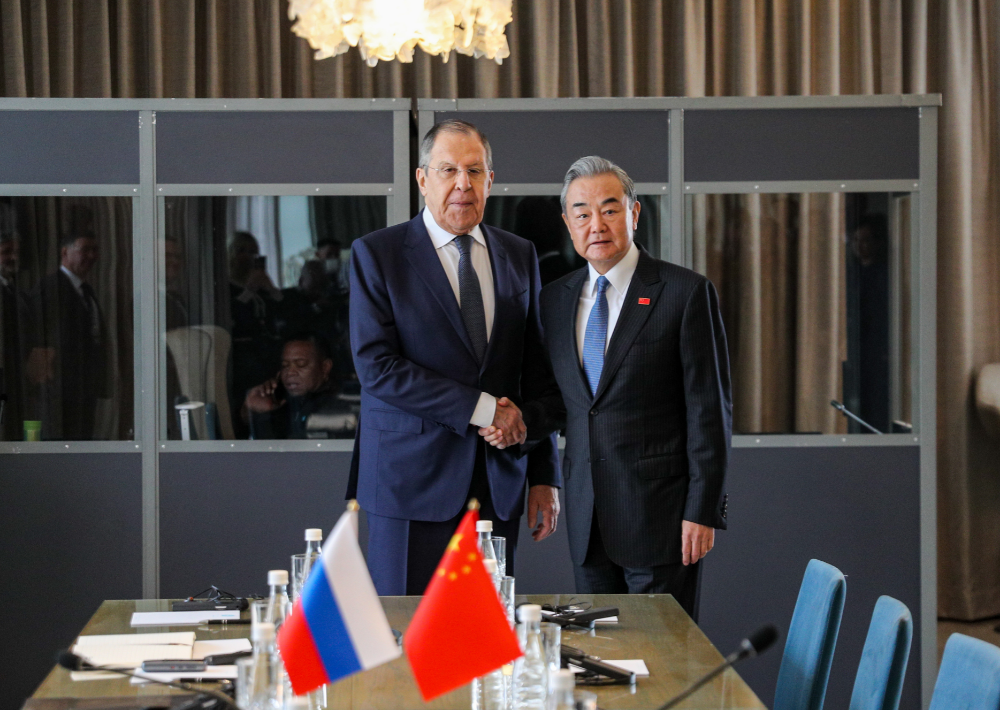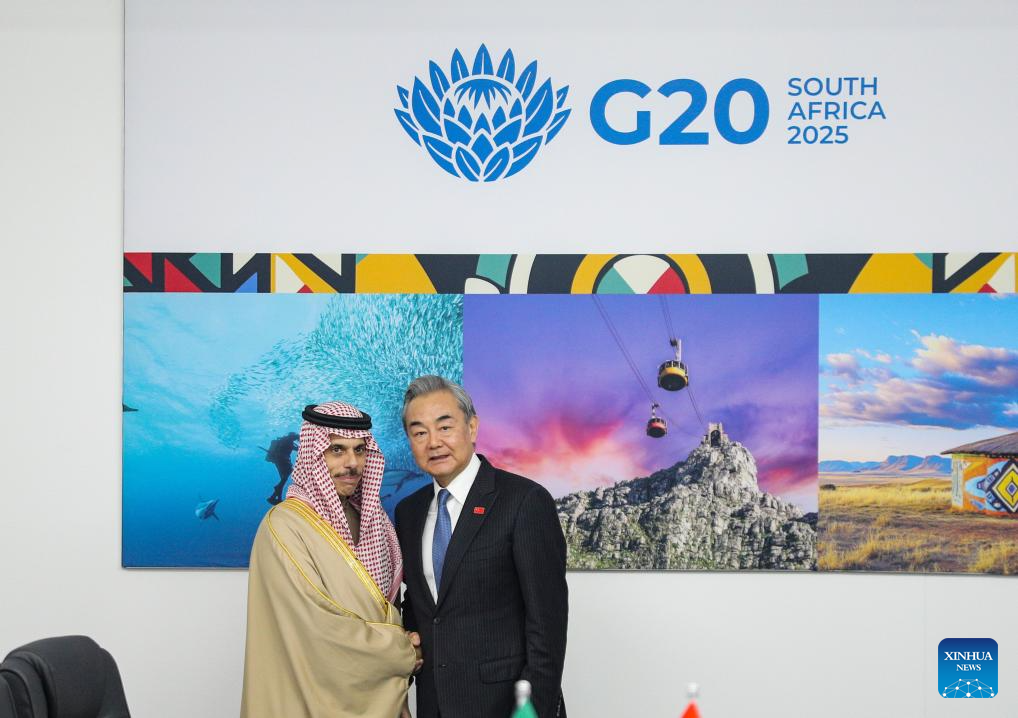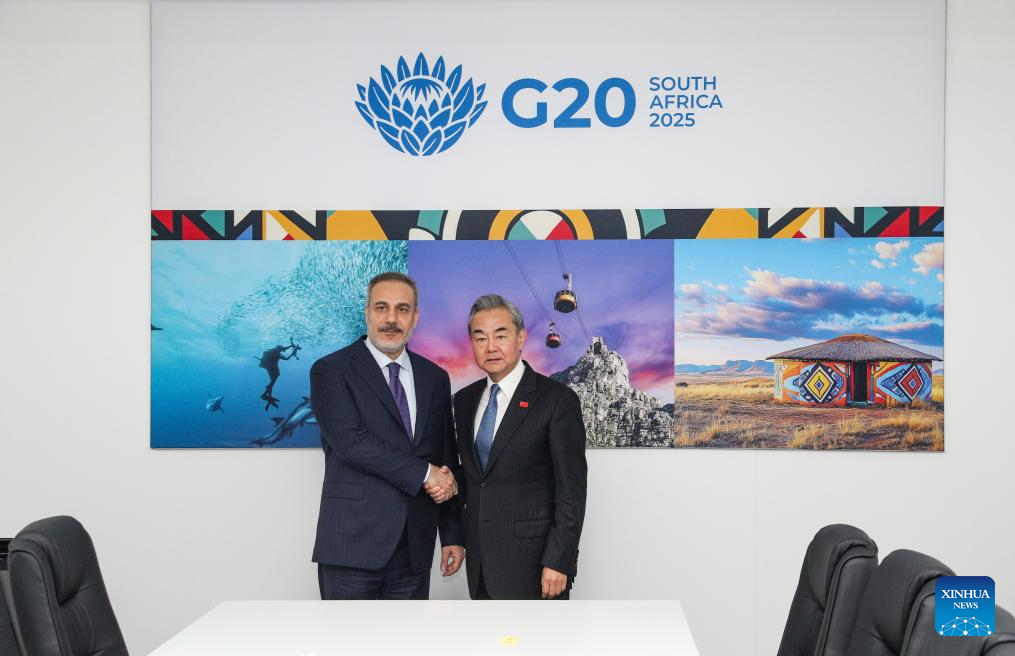
JOHANNESBURG - Chinese Foreign Minister Wang Yi on Thursday met with his Russian, Saudi and Turkish counterparts to discuss bilateral ties on the sidelines of the Group of 20 Foreign Ministers' Meeting in Johannesburg, South Africa.
Russian Foreign Minister Sergei Lavrov
During his meeting with Russian Foreign Minister Sergei Lavrov, Wang said that the China-Russia comprehensive strategic partnership of coordination for a new era is advancing to a higher level and broader dimensions.
The two sides have maintained steady progress in mutually beneficial cooperation and engaged in close and effective strategic coordination, playing a crucial role in safeguarding the common interests of both countries and their peoples while advancing the process of global multipolarity, said Wang, also a member of the Political Bureau of the Communist Party of China Central Committee.
China is willing to work with Russia to fully implement the important consensus reached by the two heads of state and to further advance China-Russia relations in the new year, he added.
Lavrov, for his part, said that Russia is willing to work with China to strengthen high-level exchanges, deepen practical cooperation in economy, trade, finance, culture, and other fields, and promote the further development of the China-Russia comprehensive strategic partnership of coordination.
Noting that Russia and China both uphold multipolarity and serve as stabilizing forces in a complex and turbulent world, he said that Russia highly recognizes the global initiatives put forward by China, values the high level of mutual trust between the two countries, and is willing to continue to strengthen communication and coordination with China under the BRICS mechanism, the Shanghai Cooperation Organization, the United Nations, the G20, and other frameworks.
The two sides also exchanged views and coordinated positions on international and regional issues of mutual concern, including the situation in the Middle East.

Saudi Arabia's Foreign Minister Faisal bin Farhan Al Saud
At the meeting with Saudi Arabia's Foreign Minister Faisal bin Farhan Al Saud, Wang noted that since the establishment of diplomatic ties 35 years ago, China-Saudi Arabia relations have overtaken others from behind and are now at the forefront of China's relations with Middle East countries.
China cherishes the mutual trust and friendship established by the top leaders of the two countries and has always placed China-Saudi Arabia relations at a key position in its Middle East diplomacy, Wang underlined.
China is willing to maintain exchanges at all levels and expand cooperation with Saudi Arabia in fields such as economy, trade, investment, new energy, digital economy, information and telecommunications, and high-end manufacturing, to push China-Saudi Arabia relations to a higher level, he said.
The foreign minister further said that China appreciates Saudi Arabia's active mediation of hotspot issues and is happy to see Saudi Arabia play a constructive role in regional peace and stability. With the Palestinian issue at the core of the Middle East issue, China will continue to stand firmly with its Arab brothers and make efforts to correct historical injustice thoroughly, and restore lasting peace in the region at an early date, Wang added.
ALSO READ: Li: China prioritizes Saudi Arabia in overall diplomacy
For his part, Faisal said that Saudi Arabia and China are comprehensive strategic partners and their relations are of vital importance. He said Saudi Arabia attaches great importance to cooperation with China and looks forward to taking the opportunity of the 35th anniversary of diplomatic ties to strengthen high-level exchanges with China and achieve more successes in bilateral relations.
Sharing the same philosophy, Saudi Arabia and China are committed to maintaining peace and stability and agree to resolve differences through dialogue, said Faisal.
Saudi Arabia attaches great importance to China's role as a major country with important influence, and hopes to find more feasible political solutions to hotspot issues with China's support, he said.
Saudi Arabia opposes the forcible displacement of the Palestinian people in Gaza, highly appreciates China's adherence to principles and upholding justice on the Palestinian-Israeli issue, and hopes and believes that China will continue to play a positive role for peace in the Middle East, Faisal added.
The two sides also exchanged views on China's relations with Arab and Gulf countries, and agreed to strengthen communication and coordination to achieve more concrete results in China-Arab and China-Gulf practical cooperation.

Turkish Foreign Minister Hakan Fidan
When meeting with his Turkish counterpart Hakan Fidan, Wang noted that both China and Turkiye are part of the Global South and are accelerating their industrialization, there is significant potential for practical cooperation between the two countries.
China attaches great importance to the relations with Turkiye and places bilateral ties at an important position in its Middle East diplomacy. China is willing to strengthen communication and coordination with Turkiye, deepen the synergy of development strategies, expand cooperation areas, and bring benefits to the two countries and other countries in the region, said Wang.
Wang thanked Turkiye for its assistance in the recent evacuation of Chinese citizens from Syria, adding that resolutely fighting terrorism in all forms serves the common interests of both China and Turkiye, and is also a widely shared consensus of the international community.
China is willing to strengthen counter-terrorism cooperation with Turkiye and jointly safeguard regional and world peace and tranquility, Wang said.
Fidan, for his part, noted that Turkiye and China have maintained close exchanges at all levels and in all fields in recent years, with meetings of the intergovernmental cooperation committees successfully held, the Middle Corridor and the Belt and Road Initiative smoothly aligned, and China becoming Turkiye's second-largest trading partner.
READ MORE: Chinese, Turkish presidents mark 50th anniversary of ties
He said that Turkiye is willing to expand trade and investment with China, explore cooperation in emerging fields such as renewable energy, information technology and artificial intelligence, and continue strengthening collaboration on counterterrorism, law enforcement and security at both bilateral and multilateral levels.
The two sides also exchanged views on regional hotspot issues. Turkiye appreciates China's just position on issues such as the Ukraine crisis and the Palestinian issue, supports the six-point consensus jointly proposed by China and Brazil, agrees that the two-state solution must be adhered to, and welcomes China's efforts to strengthen ties with regional countries, said Fidan.



